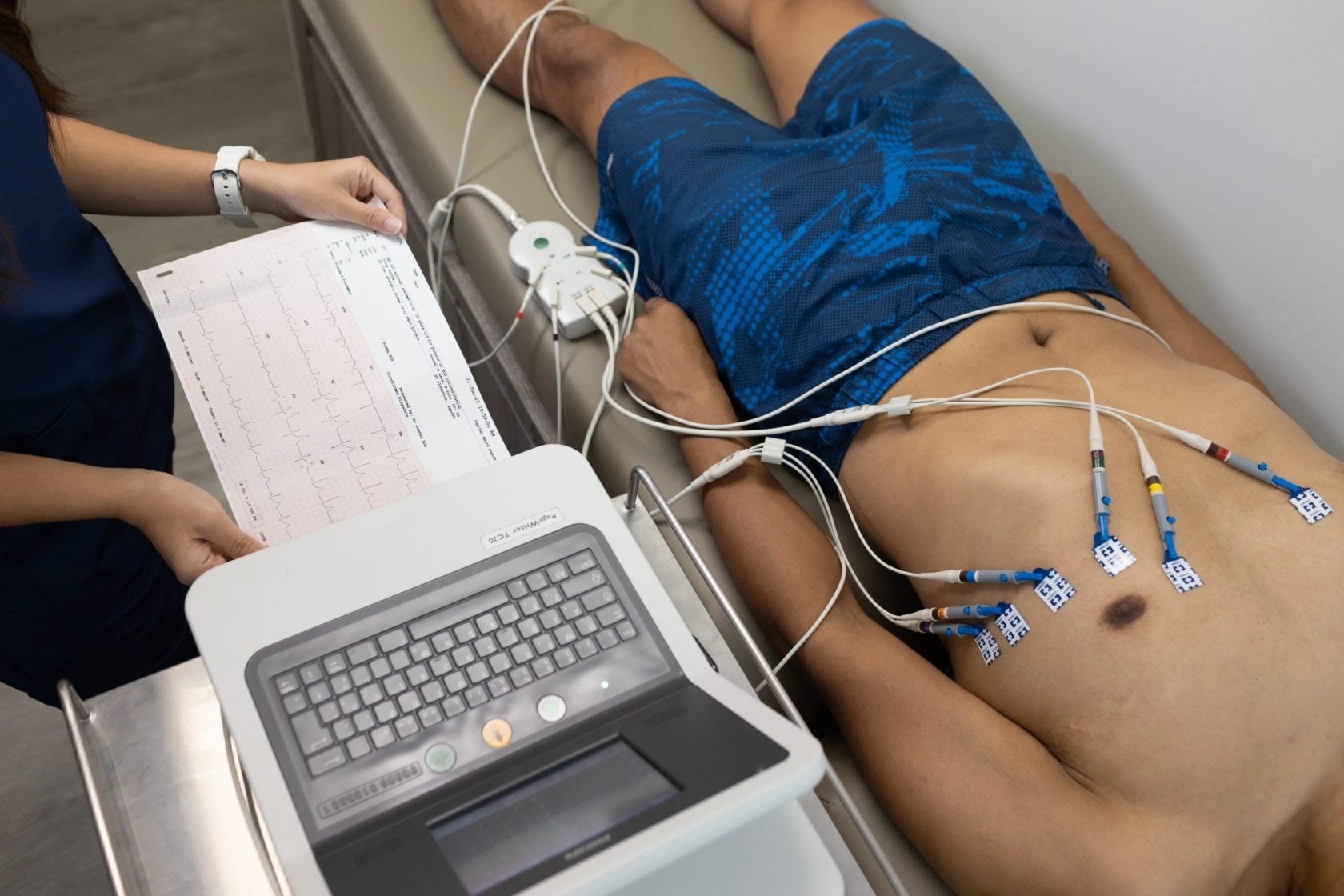ECG
An Electrocardiogram (ECG or EKG) is a non-invasive diagnostic test used to measure the electrical activity of the heart. It is a fundamental tool in the evaluation of heart health and helps in detecting various cardiac conditions such as arrhythmias, heart attacks, and other heart-related issues. By recording the heart's electrical impulses, an ECG provides valuable information about the heart's rhythm, rate, and overall function, aiding healthcare professionals in diagnosing and monitoring cardiac conditions.
During an ECG procedure, small electrodes are attached to the skin on the chest, arms, and legs. These electrodes detect the electrical signals generated by the heart as it beats and transmit this data to an ECG machine. The machine then displays these signals as waves on a graph, which can be interpreted by a doctor. The procedure is quick, painless, and usually takes about 5 to 10 minutes to complete. ECGs are commonly performed as part of a routine check-up, especially for individuals with a history of heart disease, chest pain, or other cardiovascular symptoms.
There are several types of ECG tests, each serving a specific diagnostic purpose. **Resting ECG** is conducted while the patient is lying down and at rest, providing a snapshot of the heart's activity under baseline conditions. **Stress ECG** or **Exercise ECG** is performed while the patient exercises on a treadmill or stationary bike, helping to assess how the heart responds to physical exertion. This is particularly useful for detecting ischemia, a condition where the heart's blood supply is reduced. **Holter Monitoring**, another form of ECG, involves wearing a portable device that records the heart's activity over 24 to 48 hours, providing a continuous record of the heart's performance in everyday activities.
ECGs are recommended for individuals experiencing symptoms such as chest pain, palpitations, shortness of breath, or dizziness, as these can be indicative of underlying heart problems. They are also used in pre-surgical evaluations, routine health screenings, and to monitor the effectiveness of treatments for heart conditions. Early detection of heart abnormalities through ECG can lead to timely intervention, reducing the risk of severe complications such as heart attacks or strokes.
Several factors can influence the results of an ECG, including age, gender, medications, and electrolyte imbalances. It is crucial for patients to inform their healthcare provider of any medications they are taking, as certain drugs can affect the heart's electrical activity. Additionally, improper placement of electrodes or movement during the test can lead to inaccurate results. In some cases, additional tests such as an echocardiogram or cardiac MRI may be recommended to provide a more comprehensive evaluation of heart health.
One of the key benefits of an ECG is its ability to provide immediate results, allowing healthcare providers to make prompt decisions regarding further diagnostic steps or treatments. For individuals with known heart conditions, regular ECGs can monitor disease progression and the effectiveness of prescribed therapies, ensuring optimal management of heart health. The test is safe, cost-effective, and widely accessible, making it an essential tool in cardiovascular care.
Despite its benefits, an ECG is not always conclusive on its own. It may not detect all heart problems, especially if the condition is intermittent or not present during the test. Therefore, it is essential to consider ECG results alongside other clinical findings and patient history. Consulting a healthcare professional is necessary to interpret the results accurately and to determine the appropriate course of action based on the individual's overall health profile.
In conclusion, an ECG is a valuable and widely used diagnostic tool for assessing heart health. Its ability to detect and monitor various cardiac conditions makes it an indispensable component of cardiovascular care, helping individuals maintain heart health and prevent serious complications.
- Non-Invasive and Painless: The procedure involves no discomfort and is completed in a few minutes.
- Immediate Results: Provides quick insights into heart health, aiding in prompt diagnosis and treatment.
- Comprehensive Heart Assessment: Detects a range of heart conditions, including arrhythmias and ischemia.
- Versatile Testing Options: Includes resting, stress, and Holter monitoring for various diagnostic needs.







